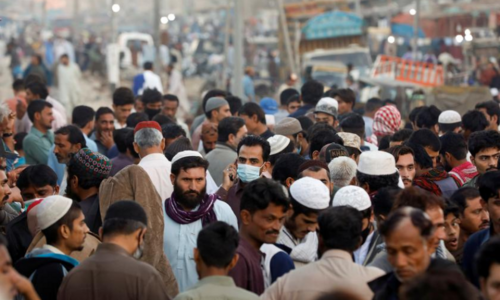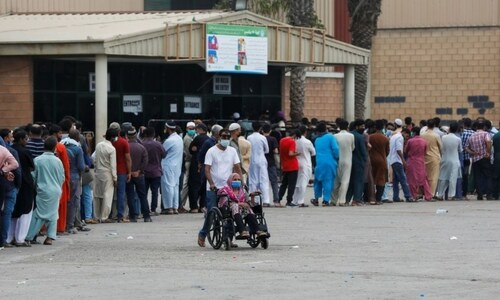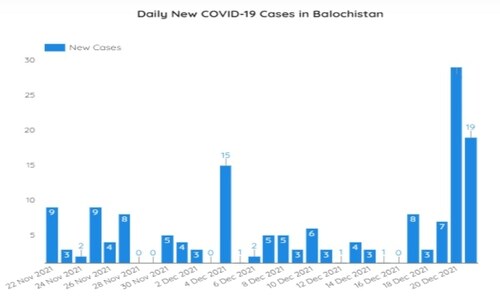ISLAMABAD: While the most transmissible new variant of Covid-19 has reached over 100 countries, Pakistan on Tuesday announced that so far 79 confirmed cases of Omicron had been reported across the country out of which 85 per cent was of local transmission.
Dr Javed Akram, a member of the National Scientific Task Force on Covid-19, suggested that the government tighten restrictions and limit the number of participants of indoor events such as weddings to curb Omicron.
A statement issued by the National Institute of Health (NIH) said that since the World Health Organisation had designated Omicron as a variant of concern on November 26, the Ministry of National Health Services, National Command and Operation Centre (NCOC), NIH and provincial health departments remained vigilant to detect the new variant in Pakistan.
“The first case of Omicron was reported on December 13 in Karachi. As of December 27, a total of 75 Omicron cases have been confirmed, (including) 33 in Karachi, 17 in Islamabad and 13 in Lahore. Twelve cases were associated with international travel. The relevant authorities have isolated the patients and initiated contact tracing in order to control the spread of the variant,” it stated.
First case was reported in Karachi on Dec 13
Four more cases of Omicron were reported from Islamabad on Tuesday, taking the city’s tally to 21.
“Vaccination and SOPs (standard operating procedures) continue to be our best defence against Covid-19 despite the mutations being reported. All government-approved Covid-19 vaccines available in Pakistan remain highly effective at preventing severe disease and hospitalisation. The government urges everyone to get both doses of Covid-19 vaccine as well as the booster dose as per the eligibility criteria and process. More details are available at the NCOC website (ncoc.gov.pk) and Sehat Tahaffuz Helpline (1166),” statement said.
Dr Javed Akram, who is also Vice Chancellor of University of Health Sciences, told Dawn that according to principle of public health, only a proportion of disease is detected. “So there can be some of the cases which could not be detected. As Omicron is the most transmissible variant so I suggest that restrictions should be tightened. Unfortunately, wedding season is going on due to which around 500 guests are gathered in a hall and no one, including bride and groom, wears a mask. I suggest that the number of indoor guests should be decreased. We should sacrifice our desires rather than wishes,” he said.
“People should get themselves vaccinated and strictly adhere to the SOPs. Omicron came from Africa and I fear that more variants may arrive from there because there is very low vaccination rate in the continent. Omicron is more transmissible as compared to Delta, but luckily it is not as virulent as Delta,” Dr Akram said.
According to sources, a person, who arrived from the UAE to Islamabad on December 25, was detected with Omicron. Similarly, a woman, who arrived from abroad, was found positive. Two persons in Bahara Kahu area of the federal capital tested positive for Omicron. This proves that local transmission of the virus has increased.
Islamabad District Health Officer Dr Zaeem Zia said Omicron was highly transmissible and suggested that the masses get themselves vaccinated at the earliest. “Vaccine is the only shield against the virus as it reduces chances of health complications in case of infection,” he said.
According to the NCOC data, 291 Covid-19 cases and three deaths were reported across the country over the past 24 hours, with national positivity rate at 0.69pc. As many as 636 patients were on critical care on Tuesday.
Published in Dawn, December 29th, 2021















































